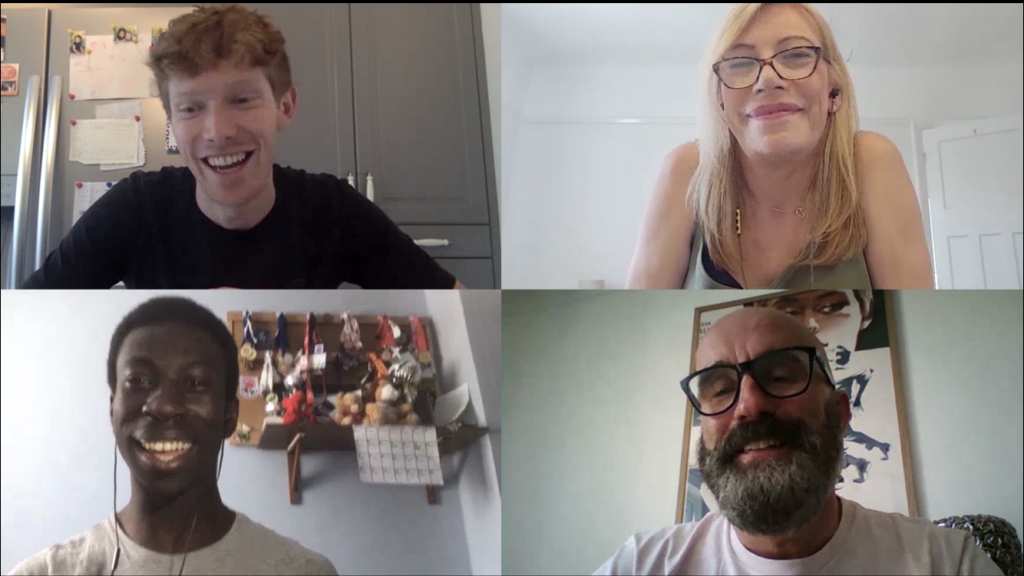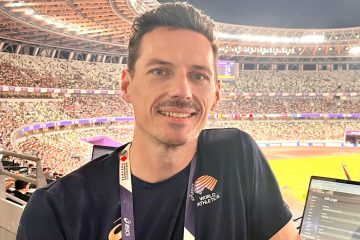Coming Out Day: Athletics Pride Network’s Gareth Burrell shares his story

Gareth Burrell is British Athletics’ Communications and Content Manager, and a member of the Athletics Pride Network. This is his coming out story…

A three-letter word. Gay. So easy to type out, but so difficult to say out loud for so long.
But now, I’m comfortable saying that I’m gay.
It’s appropriate on Coming Out Day to be open about who I am. Being your authentic self is so important. To me, #AuthenticMe means having the confidence to be you without hiding a part of yourself. Ultimately being yourself has a positive impact on you personally, and everyone around you.
Growing up, positive representations of all things LGBT+ and role models were few and far between. I remember in a TV magazine, a kiss between two men was covered up with ‘censored’ tape (I know it was The Bill / police tape etc, but chill out TV Times); in newspapers, public figures who were ‘outed’ were treated like criminals; and in sport… well, in my little world there were no visible LGBT+ role models that I was aware of.
I have loved sport all my life. When I was younger, I played football, tennis and golf, went swimming, started athletics at 14, and even did a bit of judo (it should be said, the latter was not my strong suit!) At seven years old, I went to my first Huddersfield Town game, where I’m still a season ticket holder, for my sins. Whenever sport was on TV, I would watch every last minute that I could, whatever the sport, because I was obsessed. I still am!
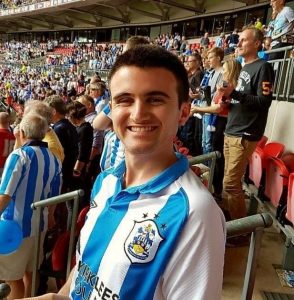
However, being LGBT+ in sport rarely came up. Not that it necessarily tempered my enjoyment of sport, neither as a competitor or viewer, but it was a noticeable omission in my teenage years.
When I was 13 years old, I started to understand what being gay meant, and that I might be it – not that I knew how to process it at the time or accept it. I just knew. I blame Freddie Ljungberg in those Calvin Klein ads (ironically on the back of my brother’s FHM magazine!) and the John Paul and Craig ‘McDean’ romance in Hollyoaks.
But in general, being LGBT+ was portrayed negatively or LGBT people’s existence was debated. It still is by some, depressingly. So there was just a lot of confusion, and I felt lost.
I was 25 when I ‘came out’ to my family and a few close friends. I could look back on those intervening years with a lot of bitterness, and I do from time to time. But I try to tell myself that doing so is a waste of energy. Life is too short, so I focus on what the future holds and on making sure inclusion is at the heart of everything I do, to make it an easier journey for others.
What gave me the confidence to come out to my parents and brother in 2018?
Well, I had a practice run with a friend beforehand and I didn’t burst into flames – although I think it took about 15 minutes to spit it out.
I think it was more because I was exhausted from keeping it from them. The majority of LGBT+ people will know that hiding a part of yourself to those closest to you is tiring. And ultimately, their response was amazing. Not everyone gets that reaction, so I don’t take it for granted at all. The way the weight lifted off my shoulders is indescribable.
But it’s also worth noting that reading and hearing stories from LGBT+ people was vital for me gaining confidence. Knowing there were other people like me, that I could relate to, was validating.
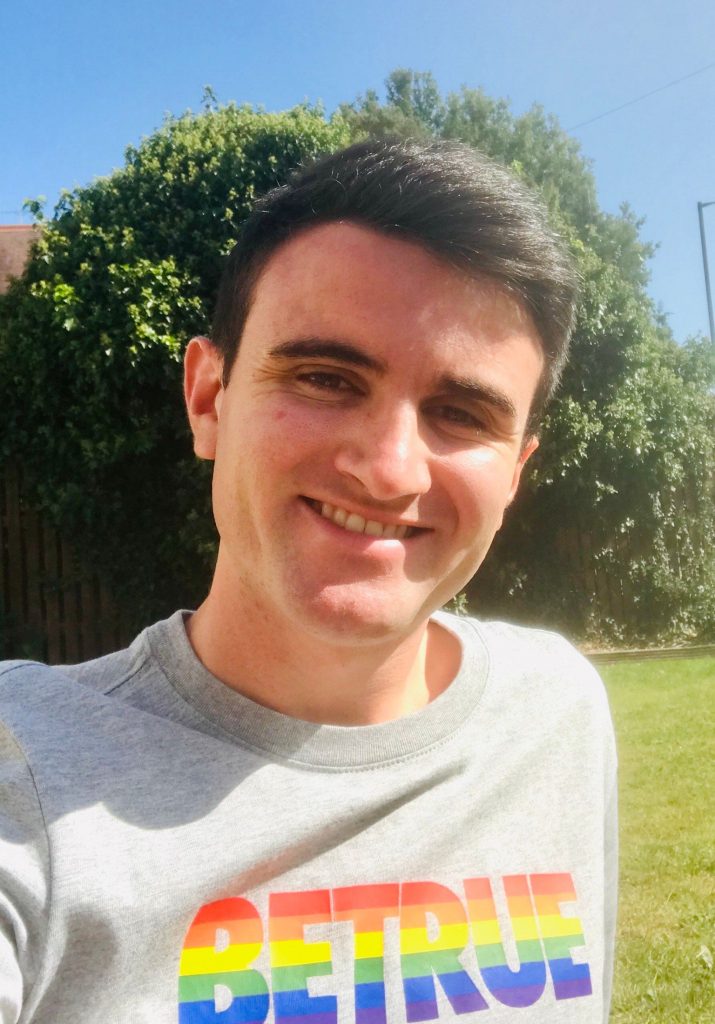
So, I got the courage, ripped the plaster off, and that was that, all good, right?
Wrong.
Another year or so passed and I had only told one or two people at work, which was the place I was spending the majority of my time, whether in the office or on trips away from home. Athletics championships are our busiest time anyway, so add in checking yourself constantly to hide a part of yourself, and the stress of the situation multiplies.
But the ‘risk’ of destroying strong working relationships with people and being treated differently weighed heavily on my mind. I generally avoided going to drinks and socialising during the evenings as the prospect of facing personal questions concerned me. In my view, it was easier to stay quiet.
But then, near the end of 2019, Donna Fraser – UK Athletics’ Equality, Diversity and Engagement Lead – approached me about a ‘Let’s Talk about LGBT+ in Athletics’ event. I had been an ED&I Advocate at UKA since 2018, taking an interest in sexual orientation and gender identity (maybe I wasn’t hiding it well!) But now the organisation was pressing ahead with something significant in this area and it lifted me again.
After an initial chat with Andy Paul and Ethan Akanni, a coach and an athlete in the sport who had approached Donna about starting an LGBT+ network, we had our first meeting – and the rest is history.
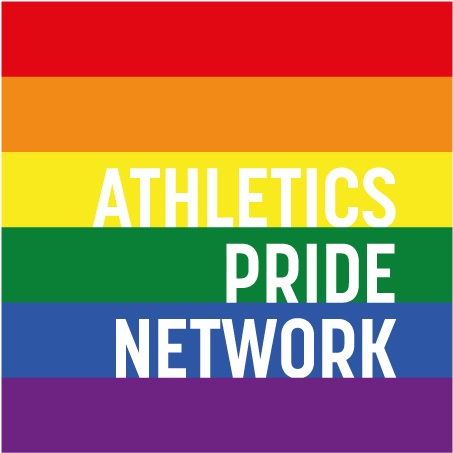
We launched the Athletics Pride Network in April this year and the reaction was so positive. I was speaking to people with similar experiences across the sport, and they were sharing where they were on their journeys and how they wanted to improve the lives of LGBT+ people in the sport.
But I wasn’t being honest about myself or my experiences.
Fast forward to June, and we recorded an online conversation between Tom Bosworth, Susie O’Connor, Ethan and Andy. I was listening in to the recording for our social media channels. It was magnificent (be sure to check it out), focusing on how being their authentic selves had improved their performance, made them feel free and happier in life.
They also talked about the times when they were ‘in the closet’ and how that made them feel. One participant spoke about how they felt ‘shrivelled as a person’ as they hid a part of their identity. That comment stayed with me.
Afterwards, I emailed them all thanking them for their openness and honesty. Then I just opened up about where I was in my own journey. I hit send, and immediately thought ‘oh my god, what have you done? Can I recall this email?’ Anyway, thank goodness I didn’t – the messages I received from each of them were full of compassion and support. It felt like an important step.
The Athletics Pride Network is still gathering momentum. I hope the group will continue to grow and make the sport even more inclusive for everyone who is LGBT+ in the athletics family. Just being a part of it over the first few months has been so beneficial to me. If it can have that impact on others, then we can all be very proud indeed.
Around the same time as this, I was also introduced to the Sports Media LGBT+ network and suddenly I realised I didn’t have to hide the fact that I was gay. Just being aware that there were other LGBT+ people working in sport and media who were 100% themselves was really significant for me.
I also told my team that I work with at British Athletics (my boss had known earlier and was super supportive), and their reaction was great. That might not sound like a big deal to some but when you’ve worried about how people will react for so long, it is so important.
Allyship is so important too.
Look at the San Diego Loyal and Landon Donovan’s reaction to a player making a homophobic comment towards Collin Martin recently. Not just brushing it under the carpet and saying it is ‘banter’ but walking off the field of play – that was an iconic moment. This was about a team, from management to players, educating themselves, understanding their team-mates, and taking meaningful actions. That speaks louder and has so much more substance than any rainbow-decorated logos on social media channels for one month of the year.
There are so many ways to be a better ally. Read up on LGBT+ issues, use inclusive language, and see how you can make your workplace more inclusive. Look, if you can browse your Insta feed, Rightmove or Mail Online all day, you can go onto the Stonewall website, read up about great organisations in sport such as Pride Sports, listen to the BBC LGBT Sport Podcast, or find great stories on the Sky Sports website which are creating much-needed visibility for LGBT+ people in sport, and widen your knowledge.
I’m no expert. I’m learning every day; I’m not complacent. If we collectively put the work in, we will have a more inclusive society where everyone feels comfortable being 100% authentically themselves in all aspects of their life.
Here I am at 27 and I’m properly putting this down into words for the first time. People I’ve known for years, worked with, or who are just passing acquaintances may see this and be surprised, or give a shrug of the shoulders. Others may be like Phoebe in Friends, saying: ‘THAT IS BRAND NEW INFORMATION’.
Whichever way, for this Coming Out Day, that is my story. It’s one of millions and every one is unique. There is no right way or set timeframe when it comes to speaking about your sexuality. I always thought there was. But please know that when you are ready, a lot of people will be there to support you along the way.
Thank you to Gareth – you can follow him on Twitter at @gareth2burrell, and on Instagram at @gareth_burrell.
For more information on the Athletics Pride Network, visit the webpage on the UK Athletics website.
Sports Media LGBT+ is a network, advocacy and consultancy group that is helping to build a community of LGBT+ people and allies in sport. We’re here to help. Learn more about us on our About page; to get in touch, Contact Us here.
Further reading…
